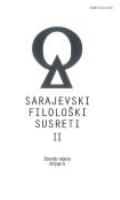PUERITIVI U BOSANSKOME JEZIKU
PUERITIV FORMS IN THE BOSNIAN LANGUAGE
Author(s): Elma DurmiševićSubject(s): South Slavic Languages
Published by: Bosansko filološko društvo
Keywords: child speech; Bosnian language; secondary pueritiv forms; hypocoristics; diminutive; dictionary; norm;
Summary/Abstract: This paper observes the formation of pueritiv forms and their usability (semantic, semiotic and pragmatic) for children and adults. It is precisely through the language and speech of ”adults” that secondary pueritiv forms are created, which deserve to be analyzed at all linguistic levels. At this point, we place special emphasis on the individual formation and metaphorization of secondary pueritiv forms. Through our analysis of a child’s speech through the phonetic, phonological, morphological and syntactic levels, we were able to detect in ”our boy” deviations from the models of child speech-adoption theory. In most cases, pueritiv forms in language are used to evoke positive emotions, and to contribute to the emotional bonding between child and adult through the use of diminutives and hypocoristics. They also have the function of communicational adjustment within different groups: children and children; children and adults; and adults and adults (secondary pueritiv forms), indifferent socio-cultural situations. This analysis also explores if and to what extent pueritiv forms exist in Bosnian language dictionaries, and what their normative status is. We conclude that pueritiv forms will certainly find a place in dictionaries of jargon and, later, in standard language dictionaries.
Journal: Sarajevski filološki susreti: zbornik radova
- Issue Year: 2/2014
- Issue No: 1
- Page Range: 200-215
- Page Count: 16
- Language: Bosnian

